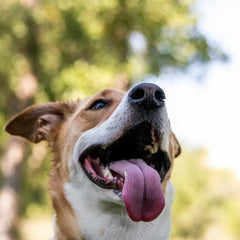Introduction
As pet parents, we often share our lives and sometimes our plates with our furry companions. One food that frequently sparks curiosity is cheese. It's a favorite snack for many humans, but is it suitable for dogs? The question we seek to answer is, "Can my dog eat cheese?" Let's explore this dairy domain to offer clarity for dog owners everywhere.
A Dairy Dilemma or a Cheesy Treat?
Cheese, with its myriad of flavors and textures, can be a delightful treat. But when it comes to dogs, is it a dairy delight or a potential problem?
Benefits of Cheese for Dogs:
- High in Protein: Essential for muscle development and overall health.
- Calcium-Rich: Good for bone health.
- Vitamin A and B-Complex: Beneficial for metabolism and skin health.
- Fats: While fats are necessary for a balanced diet, moderation is crucial to avoid weight gain.
However, while cheese can offer nutritional benefits, not all dogs can stomach it equally well. Some dogs might be lactose intolerant, meaning they have difficulty digesting dairy products.
Risks of Cheese for Dogs
Like any food, cheese isn't without its potential pitfalls for our canine companions.
- Lactose Intolerance: Just like humans, some dogs cannot effectively digest lactose, leading to gastrointestinal issues.
- High Fat Content: Some cheeses are high in fat, which can lead to obesity and pancreatitis in dogs if consumed in large quantities.
- Salt: Many cheeses contain significant amounts of salt, which isn't ideal for dogs.
- Additives: Cheeses, especially those flavored or processed, might contain ingredients harmful to dogs, like garlic or onions.
How to Safely Feed Cheese to Dogs
If you're considering introducing cheese to your dog's diet, it's essential to do so safely and in moderation.
Serving Guidelines:
- Start Small: Initially offer a tiny amount to see how your dog reacts digestively.
- Opt for Low-Fat Varieties: Cottage cheese or mozzarella are often better choices than richer cheeses.
- Avoid Flavored Cheeses: Stick to plain cheese and avoid those with added ingredients.
- Limit Frequency: Cheese should be an occasional treat, not a regular part of your dog's diet.
Cheeses to Consider:
Cheese Type |
Benefits |
Considerations |
| Cottage Cheese | Low in fat and lactose | Ensure it's unsalted |
| Mozzarella | Low in fat and salt | Choose plain varieties |
| Cheddar | Rich flavor | Higher in fat |
| Cream Cheese | Soft and spreadable | Avoid flavored varieties |
FAQs: Cheese and Canines Clarified
1. How can I tell if my dog is lactose intolerant?
Symptoms might include diarrhea, gas, or vomiting after consuming dairy. Always consult with a veterinarian if you're concerned.
2. Can puppies eat cheese?
In moderation, cheese can be given to puppies. However, their digestive systems are more sensitive, so always start with a tiny amount and monitor for any adverse reactions.
3. Are there any cheeses I should avoid entirely?
Avoid any cheeses containing added ingredients that are harmful to dogs, such as garlic, onions, or chives. Also, steer clear of high-fat or overly salty cheeses.
4. My dog ate a large amount of cheese. What should I do?
Monitor your dog closely for signs of stomach upset or discomfort. If they exhibit distressing symptoms or consume a potentially harmful cheese variety, consult a veterinarian immediately.
5. Can cheese be beneficial for giving my dog medication?
Yes, many dog owners use a small amount of cheese to wrap around pills, making medication time easier. Just ensure the cheese type is safe for your dog.
Conclusion
Cheese can be a delightful treat for many dogs, but it's essential to approach it with knowledge and caution. By understanding the potential benefits and risks, dog owners can make informed decisions, ensuring their pets enjoy treats safely. After all, our dogs' well-being is always top priority, and their diet plays a pivotal role in their overall health.




